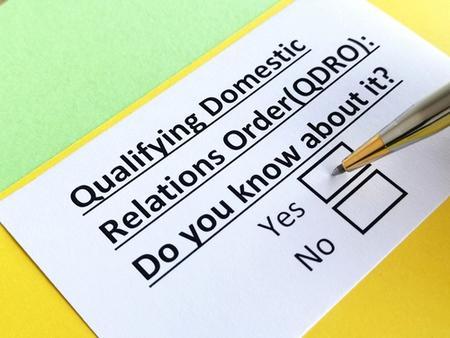Recent Blog Posts
How to Protect Your Credit in a Michigan Divorce
 There is no denying the impact that a divorce has on a person’s life. Even if they are the spouse who wants to end the marriage, there could still be effects on their family and social relationships that they may find jarring. There is also the financial impact a divorce has. Many people find that after a divorce, their credit score has gone down. It is not the act of divorcing that can cause this decrease, but rather the financial obligations and standing that happens during and after the divorce process. The following are some steps you can take to help minimize that impact.
There is no denying the impact that a divorce has on a person’s life. Even if they are the spouse who wants to end the marriage, there could still be effects on their family and social relationships that they may find jarring. There is also the financial impact a divorce has. Many people find that after a divorce, their credit score has gone down. It is not the act of divorcing that can cause this decrease, but rather the financial obligations and standing that happens during and after the divorce process. The following are some steps you can take to help minimize that impact.
Protecting Credit Scores
Surveys have found that approximately 55 percent of women and 40 percent of men find that their divorce creates a negative impact on their credit score. While women experience the higher impact, they also report higher incidents of their former spouse ruining their credit – 50 percent – compared to only 37 percent of men who face the same consequences because of their former spouse.
Can Information Shared On Social Media Affect My Divorce?
 The breakdown of a marriage can be difficult for both spouses, and in some cases, marital issues may become public knowledge due to details that a couple, their children, or other family members or friends share on social media. Since so many people are used to sharing information about themselves when they use Facebook, Instagram, TikTok, Twitter, or other social networks, they may expect that they can continue to discuss their lives online during the divorce process. However, it is important to understand what types of information should or should not be shared and how posts on social media may play a role in a couple’s divorce.
The breakdown of a marriage can be difficult for both spouses, and in some cases, marital issues may become public knowledge due to details that a couple, their children, or other family members or friends share on social media. Since so many people are used to sharing information about themselves when they use Facebook, Instagram, TikTok, Twitter, or other social networks, they may expect that they can continue to discuss their lives online during the divorce process. However, it is important to understand what types of information should or should not be shared and how posts on social media may play a role in a couple’s divorce.
Social Media Posts as Evidence in a Divorce Case
Information posted online, such as photos or status updates, is generally available to the public. This means that anything posted to social media could potentially be raised during the divorce process. Even posts that a person believes are private could be uncovered by the other spouse or their attorney. Because of this, it is important to treat everything posted on social media as something that could potentially be raised in divorce court.
How Can I Legally Adopt My Stepchild in Michigan?
 Countless studies show that children thrive with the love and support of two parents. However, sometimes, those parents are not related to the child by blood. Stepparents often play a crucial role in a child’s life. However, stepparents do not have the same legal rights and protections as biological parents unless they legally adopt the child.
Countless studies show that children thrive with the love and support of two parents. However, sometimes, those parents are not related to the child by blood. Stepparents often play a crucial role in a child’s life. However, stepparents do not have the same legal rights and protections as biological parents unless they legally adopt the child.
If you are a stepparent who would like to adopt your stepchild, read on to learn about the stepparent adoption requirements and procedures in Michigan.
Terminating the Biological Parent’s Parental Rights
Children can only have two parents by law. This means that you may need to get a parent’s parental rights terminated before you can adopt your stepchild. Some parents voluntarily agree to give up their parental rights – especially if they recognize that the stepparent is in a better place to care for their child. Other parents refuse to surrender their parental rights. If the child’s biological parent does not want to give up his or her rights to allow you to adopt the child, you will need to attend a hearing and provide sufficient reasoning for the termination of the parent’s rights.
How to Prepare for a High-Conflict Divorce in Michigan
 The term “high-conflict divorce” may initially seem redundant. After all, a couple would not be seeking a divorce if the marriage did not involve a significant amount of conflict. However, some divorce cases are much more contentious than others.
The term “high-conflict divorce” may initially seem redundant. After all, a couple would not be seeking a divorce if the marriage did not involve a significant amount of conflict. However, some divorce cases are much more contentious than others.
To end your marriage, you and your spouse will need to decide how to divide real estate, vehicles, bank account balances, and other assets. If you have children, you will need to develop a parenting plan that allocates parental responsibilities and parenting time. You may also need to address additional issues like spousal support. If you and your soon-to-be-ex disagree about the terms of your divorce and are unable to discuss these issues productively and rationally, you may be in store for a high-conflict divorce. Fortunately, there are things you can do to prepare.
Spousal Support and Property Concerns When Getting Divorced After Age 50
 Did you know that older people make up a huge percentage of divorcing couples in Michigan? So-called "grey divorce" is on the rise in Michigan and across the U.S.
Did you know that older people make up a huge percentage of divorcing couples in Michigan? So-called "grey divorce" is on the rise in Michigan and across the U.S.
If you are thinking about getting divorced and you are over age 50, it is important to realize that you may face unique obstacles during your divorce case. You may need to address complicated financial and legal issues including the division of assets and retirement funds as well as spousal support. A knowledgeable divorce lawyer with experience in gray divorce cases can help you understand the challenges you may face during your divorce and meet those challenges head-on.
Divorce When You Are Close to Retirement
If you are in your 50s or 60s, the effect of your divorce on your retirement plans is probably a top concern. Understandably, you want to ensure that you will still have the retirement funds you need to live independently once you have stopped working. Retirement accounts are usually classified as marital property during a Michigan divorce. This means that both spouses have a claim to the funds contained in the retirement account regardless of which spouse’s name is on the account. You may need to use a qualified domestic relations order (QDRO) to divide retirement funds. The funds that accumulated before the spouses got married may be considered separate property to which only the named spouse has a claim.
Creative Options for the Marital Home in a Michigan Divorce
 Earlier this year on our blog, we addressed the question of what happens to the marital home in a divorce. In that post, we noted that in most cases, one spouse either buys out the other’s share of the home, or the spouses agree to sell the home and divide the proceeds. However, you may be wondering whether these are the only options. Perhaps you find it hard to bear the thought of parting with your home at the moment, but you lack the financial resources to keep it on your own.
Earlier this year on our blog, we addressed the question of what happens to the marital home in a divorce. In that post, we noted that in most cases, one spouse either buys out the other’s share of the home, or the spouses agree to sell the home and divide the proceeds. However, you may be wondering whether these are the only options. Perhaps you find it hard to bear the thought of parting with your home at the moment, but you lack the financial resources to keep it on your own.
If you find yourself in a similar situation, it may be possible to come up with a more customized solution, especially if you and your spouse are willing to consider an alternative dispute resolution method like mediation or collaborative divorce. Here, we look at some of the more creative options for handling your home and living arrangements after a divorce.
What Are the Benefits of Reaching a Custody Agreement in Michigan?
 When parents are dealing with legal child custody matters, including during the divorce process or after establishing paternity, the situation can sometimes become contentious. In high-conflict cases, parents are often confronted with the prospect of litigation and the time, costs, and stress that it entails. However, there is an alternative to litigation for parents who are willing and able to work together. It is well worth considering the option of negotiating a child custody agreement for the many benefits that it can bring.
When parents are dealing with legal child custody matters, including during the divorce process or after establishing paternity, the situation can sometimes become contentious. In high-conflict cases, parents are often confronted with the prospect of litigation and the time, costs, and stress that it entails. However, there is an alternative to litigation for parents who are willing and able to work together. It is well worth considering the option of negotiating a child custody agreement for the many benefits that it can bring.
Advantages of a Child Custody Agreement
Michigan family courts allow parents to work together on a child custody agreement on their own, or with the assistance of alternative dispute resolution methods like mediation or collaborative divorce. Negotiating an agreement with your child’s other parent may be the right decision for a number of reasons. Some potential benefits to consider include:
Do I Need a QDRO to Divide Retirement Assets in a Michigan Divorce?
 When it comes to property division in a divorce, Michigan is an "equitable distribution" state, meaning that spouses must divide all marital property fairly in accordance with the specific details of their situation. However, people are often surprised to learn just how many assets may qualify as marital property. Marital assets include not only properties that spouses own jointly, like the home they live in but also assets held in one spouse’s name that were acquired during the marriage. This means that much of your retirement savings could be subject to division if contributions were made to your accounts while you were married.
When it comes to property division in a divorce, Michigan is an "equitable distribution" state, meaning that spouses must divide all marital property fairly in accordance with the specific details of their situation. However, people are often surprised to learn just how many assets may qualify as marital property. Marital assets include not only properties that spouses own jointly, like the home they live in but also assets held in one spouse’s name that were acquired during the marriage. This means that much of your retirement savings could be subject to division if contributions were made to your accounts while you were married.
While dividing a retirement account is often a necessity during the divorce process, doing so is not simple. Without taking the proper steps to divide your account, you could find that the assets steeply decline in value due to income taxes and early withdrawal penalties. For this reason, it is important to understand whether you need to obtain a Qualified Domestic Relations Order, or QDRO, that allows you to divide your account while protecting the savings.
Can Mediation Help With Post-Divorce Issues in Michigan?
 Although the Michigan divorce process ends with a legally binding resolution, this may not end all conflict between the parties. Ongoing issues involving child custody, child support, and spousal maintenance can lead to new disputes in the years following a divorce, and it may be necessary to petition the court for modification or enforcement of the divorce order. However, if you can work out these post-divorce matters with your former spouse in mediation before you bring them before the court, you may save yourself time, energy, and stress.
Although the Michigan divorce process ends with a legally binding resolution, this may not end all conflict between the parties. Ongoing issues involving child custody, child support, and spousal maintenance can lead to new disputes in the years following a divorce, and it may be necessary to petition the court for modification or enforcement of the divorce order. However, if you can work out these post-divorce matters with your former spouse in mediation before you bring them before the court, you may save yourself time, energy, and stress.
Mediation for Post-Divorce Modifications
The child custody order is one of the most common elements of a divorce resolution that may need to be modified as time passes. You may feel that the order should be changed because of a change in your work schedule, a move or relocation, or a change in your children’s needs and preferences as they get older. However, you may find it difficult to reach an agreement with your children’s other parents regarding the details of the modification.
My Adoption Petition Was Denied, What Can I Do?
 The adoption process typically involves a great deal of complexities and obstacles before you can welcome your adopted child home. In the face of such adversities, it may seem like the easiest option is to give up. However, there are actions you can take to overcome these hurdles and successfully become an adoptive parent. An obstacle that prospective adopting parents should be aware of is the possibility of their adoption petition being denied. Unfortunately, even relatives to the child or stepparents who have helped to raise the child may be denied at this point. This rejection can be combated by appealing the decision in court.
The adoption process typically involves a great deal of complexities and obstacles before you can welcome your adopted child home. In the face of such adversities, it may seem like the easiest option is to give up. However, there are actions you can take to overcome these hurdles and successfully become an adoptive parent. An obstacle that prospective adopting parents should be aware of is the possibility of their adoption petition being denied. Unfortunately, even relatives to the child or stepparents who have helped to raise the child may be denied at this point. This rejection can be combated by appealing the decision in court.
Reasons a Petition May Be Denied
While it is unlikely for an adoption to be denied, it is still possible and needs to be considered when maneuvering through the adoption process. There are a wide range of reasons why your petition for adoption may be denied, including the following:











